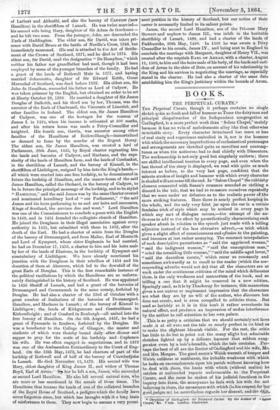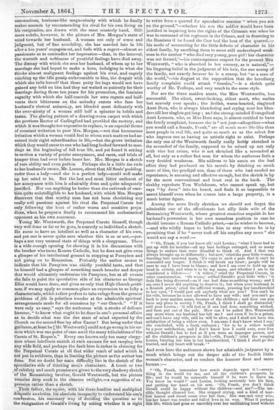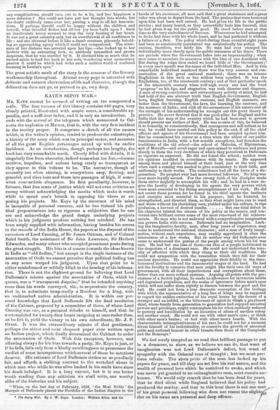BOOKS.
THE PERPETUAL CURATE.*
THE Perpetual Curate, though it perhaps contains no single sketch quite so fresh and full of humour as Tozer the dairyman and principal chapelwarden of the Independent congregation at Carlingford, is a more perfect work than " Salem Chapel," mainly because it has no vein of melodramatic alloy like that otherwise inimitable story. Every character introduced has more or less of real study and experience embodied in it, nor is the humour with which the necessary imperfections of ecclesiastical personages and arrangements are sketched quite so merciless and contemp- tuous as when the authoress had to deal chiefly with Dissenters. The workmanship is not only good but singularly uniform ; there are skilful intellectual touches in every page, and even when the last thread of the story is displayed, we read with quite as much interest as before, to the very last page, confident that the minute strokes of insight and humour with which every character is shaded will not cease till the end. In "Salem Chapel" the rubbishy element connected with Susan's romance sounded so striking a discord in the tale, that we had to re-assure ourselves repeatedly that we were under no delusion as to the realistic power of the more striking features. Here there is nearly perfect keeping in the whole, and the only very faint. jar upon the ear is a certain feminine trick of style which may be noticed in every page in which any sort of dialogue occurs,—the attempt of the au- thoress to add to the effect by parenthetically characterizing each speaker afresh in relation to the speech just made with a telling adjective instead of the less obtrusive adverb,—a trick which gives a slight effect of consciousness and effusion to the painting, and becomes at last rather annoying. The constant interpolation of such descriptive parentheses as " said the aggrieved woman," "said the indignant woman," "said the unsuspicious man," " cried the trembling little woman," "said the middle-aged lover," "said the dauntless curate," which recur so constantly and sometimes awkwardly as to recall to the reader (which the cor- responding adverbs would not do) that all the characters are at work under the continuous criticism of the mind which delineates them, is the only weakness and mannerism of the book, and so trifling a one that it might be removed in a new edition. Sparingly used, as it is by Thackeray for instance, this mannerism gives a not untrue or unpleasant impression that the characters are what they are by no will of the author, who discovers but does not create, and is even compelled to criticize them. But used so lavishly as it is in this book it rather overshoots its natural effect, and produces an impression of undue interference by the author to call attention to her own points.
This is so petty a criticism that we should certainly not have made it at all were not the tale so nearly perfect in its kind as to make the slightest blemish visible. For the rest, the critic has little to do but to point out the many slight but admirable sketches lighted up by a delicate humour that seldom exag- gerates even by a hair's-breadth, which the tale contaius. Per- haps the best of all are the Rector of Carlingford and his wife, Mr. and Mrs. Morgan. The good rector's Welsh warmth of temper and Welsh coldness of sentiment, the irritable weakness with which he looks on encroachments upon his parish without knowing how to deal with them, the baste with which (without malice) he catches at unfounded reports unfavourable to the Perpetual Curate, and the mess he makes of his judicial functions in the inquiry into them, the annoyance he feels with his wife for not believing in them, the uneasiness with which (in his respect for lyat-- good judgment) be nevertheless regards her dissent, and the 411, Chronicles of Carliniford: the Perpetual Curate. By the Author of slative
Chapel," fcc. 3 yobs. Loudon: Blackwood.
unconscious, business-like magnanimity with which he finally makes amends by recommending his rival for his own living on his resignation, are drawn with the most masterly hand. Still more subtle, however, is the picture of Mrs. Morgan's state of mind towards her husband. A woman not only of sense and judgment, but of fine sensibility, she has married late in life after a ten years' engagemsnt, and feels with a regret—almost so passionate as to contradict her impression—that, in the interval, the warmth and nobleness of youthful feelings have died away. The dismay with which she sees her husband, of whom up to her marriage she had hoped to make a hero, indulging in what she thinks almost malignant feelings against his rival, and eagerly catching up the idle gossip unfavourable to him, the despair with which she tells herself that these petty fee logs would not have gained any hold on him had they not waited so patiently for their Marriage during those ten years for his promotion, the feminine sagacity with which she half-controls her own regrets and half- vents their bitterness on the unlucky curate who fans her husband's 'clerical animosity, are blended most delicately with the over-nicety of a woman still half a spinster in habits and tastes. The glaring pattern of a drawing-room carpet with which the previous Rector of Carlingford had provided the rectory, and which it was thought too expensive to replace, is an especial theme of constant irritation to poor Mrs. Morgan,—not that humourous irritation which a woman would feel to whom such matters had as- sumed their right subordination iu life,—but the grave irritation which they would cause to one who had long looked forward to mar- riage as the beginning of full true life, and yet found it setting in motion a variety of pettier annoyances, and cares, and trials of temper than had ever before beset her. Mrs. Morgan is a sketch of rare ability and even pathos. Perhaps she is a little too rude to her husband's curate, Mr. Leeson, about that All Souls' pudding, ruder than a lady—and she is a perfect lady—could well make up her mind to be. But the last and most bitter outburst of her annoyance with him is admirably done and quite adequately justified. Nor can anything be better than the outbreak of emo- tion quite unintelligible to her husband, with which Mrs. Morgan discovers that that worthy man has not been cherishing any really evil passions against his rival the Perpetual Curate but only following the bent of rather warm and sensitive preju- dices, when he proposes finally to recommend his ecclesiastical opponent as his own successor.
Young Mr. Wentworth, the Perpetual Curate himself, though very well done so far as he goes, is scarcely so individual a sketch. He seems to have an intellect as well as a character of his own, and yet one is never quite sure whether this is so or not,—per- haps a not very unusual state of things with a clergyman. There is a wide enough opening for showing it in his discussions with the brother who turns Roman Catholic, but he does not give even a glimpse of his intellectual ground in stopping at Puseyism and not going on to Rornanism. Probably the author means to indicate that his Puseyism was chiefly youthful taste, and that lie.himself had a glimpse of something much broader and deeper that would ultimately undermine his Puseyism, but at all events she fails to paint the speculative side of his character as George Eliot would have done, and gives us only that High Church gritti- ness, if we may apply so common-place an expression to so lofty a characteristic, which rather prefers to take refuge from the greater problems of fife in pointless wonder at the admirable spiritual arrangements made for all occasions by "our Church." "If it were only as easy," says the authoress with a stroke of delicate humour, " to know what ought to be done in one's personal affairs as to decide what was the due state of mind expected by the Chinch on the second Sun lay after Easter I But being under that guidance, at least he [Mr. Wentworth] could not go wrong in his ser- mon which was one point of ease amid the many tribulations of the Curate of St. Roque's." Every one knows only too many clergy- men whose intellects snatch at such excuses for not ranging into any wide field, and perhaps the fault here is rather in claiming for the Perpetual Curate at all that wider reach of mind which is not put in evidence, than in limiting the picture as the author has done. But no doubt her main difficulty lies in the sketch of the speculative side of thinking men's characters. A touch or two of subtlety and much promise are given to the very shadowy sketch of the Romanizing brother, Gerald Wentworth, but the picture remains deep sunk in the obscure twilight,—a suggestion of ex- pression rather than a sketch.
Their father, the squire, with his three families and multiplied dolmestic anxieties, his absolute incapacity to understand his son's conhrsion, his summary way of deciding the question as to the resignation of Gerald's living by asking whether it is right
to retire from a quarrel ta• speculative reasons " when you are
on the ground,"—whether his son the soldier would have been justified in inquiring into the rights of the Crimean war when he
was in command of his regiment in the Crimea, and in deserting to the Russians if he found the Czar had the best of the quarrel,— his mode of accounting for the little defects of character in his eldest family, by ascribing them to some still undeveloped weak-
ness in the mother " who died very young, poor girl ! her character was not formed,"—his contemptuous respect for the present Mrs Wentworth, " who is absorbed in her nursery, as is natural,"—
his lingering belief in the judgment of his heir, the one scamp of the family, not exactly because he is a scamp, but " as a man of the world,"—his disgust at the supposition that the hereditary, family complaint could attack " females,"—is a sketch quite worthy of Mr. Trollope, and very much in the same style.
Nor are the three maiden aunts, the Miss Wentworths, less successful. The silent, sweet-looking, eldest aunt, who smiles but scarcely ever speaks ; the foolish, warm-hearted, ringleted Aunt Dora, who is always blundering and crying over her blun- ders till her ringlets get limp ; and the strong-minded Evangelical Aunt Leonora, who, as Miss Dora says, is almost entitled to have
the family complaint, because she is " not just—altogether—what you would call a female, Frank," are all much more life-like than most people in real life, and quite as much so as the select few
who impress one as having an artistic right to exist. Perhaps the only one of the Wentworth family really feebly sketched is the scoundrel of the family, supposed to be mixed up not only with vice but crime, who is not sketched like a scoundrel at all, but only as a rather fast man for whom the authoress feels a very decided weakness. His address to his aunts on the bad effect they had produced on his morals by thinking so much more of him, the prodigal son, than of those who had needed no repentance, is amusing and effective enough, but the sketch is by far the most conventional and least real in the book. '['he shabby reprobate Tom Wodehouse, who cannot speak up, but says "by Jove" into his beard, and finds it so impossible to assert himself even when he clines into a large property, is a much better figure.
Among the more lively sketches we should not forget the admirable one of the affectionate but silly little wife of the Romanizing Wentworth, whose greatest conscious anguish in her husband's perversion is her own nameless position in case he should become a Roman Catholic priest,—as he wishes to become, —and who wildly hopes to bribe him to stay where he is by promising that if he " never took off his surplice any more " she would not say a word:—
" ' Oh, Frank, if you but know all,' said Louisa; what I have had to put up with for months—all my best feelings outraged, and so many things to endure that were dreadful to think of. And I that was always brought up so differently ; but now,' cried the poor little woman, bursting into renewed tears, it's come to such a pass that it can't be concealed any longer. I think it will break my heart ; people will be sure to say I have been to blame ; and how I am over to hold up my head in society, and what is to bo my name, and whether I am to bo considered a widow—' 'A widow, !' cried tho Perpetual Curate, in utter consternation. Or worse,' sobbed Gerald's poor little wife : it feels like being divorced—as if one had done something wrong; and I am sure I never did anything to deserve it ; but when your husband is a Romish priest,' cried the afflicted woman, pressing her handkorohiof to her eyes, I would just ask anybody what are you? You can't be his wife, because he is not allowed to have any wife; and you can't go back to your maiden name, because of the children ; and how can you have any place in society ? Oh, Frank, I think I shall go distracted' said poor Louisa ; it will fool as if one had done something wicked, and been put out of the pale. How can I bo called Mrs. Wentworth any more when my husband has left me ? and even if he is a priest, and can't have any wife, still he will be alive, and I shall not have the satisfaction of being a widow oven. I am sure I don't know what I say,' she concluded, with a fresh outburst ; for to bo a widow would be a poor satisfaction, and I don't know how I could ever, ever live without Gerald ; but to feel as if you were an improper person, and all the children's prospects in life !—Oh, Frank r cried the weeping Louisa, burying her face in her handkerchief, I think I shall go dis- tracted, and my heart will break.' "
And even here the authoress shows her admirable judgment by a touch which brings out the deeper side of the foolish little woman's character, and so renders the humour finer and more human :—
"' Oh, Frank, remember how much depends upon it !—every- thing in the world for me, and all the children's prospects in life ; and he would be miserable himself if he were to leave us. You know he would ?' said Louisa, looking anxiously into his face, and putting her hand on his arm. Oh, Frank, you don't think Gerald could be happy without the children—and me?'—The ter- rible thought silenced her. She stopped crying, and a kind of tear- less horror and dread came over her face. She was-not very wihe, but her heart was tender and full of love in its way. What if perhaps this life, which had gone so smoothly over her unthinking head without any complidations, should turn out to be a lie, and her happiness a mere delusion ? She could not have put her thought into words, but the doubt suddenly came over her, putting a stop to all her, lamenta- tions. If perhaps Gerald could be happy without the children and herself, what dreadful fiction had all her joy been built upon ? Such an inarticulate terror seemed to stop the very beating of her heart. It was not a great calamity only, but an overthrowal of all confidence in life ; and she shivered before it like a dumb creature, piteously behold- ing an approaching agony which it could not comprehend. The utter- ance of her distress was arrested upon her lips,—she looked up to hor brother with an entreating look, so suddenly intensified and grown desperate, that he was startled by it. It alarmed him so much that he turned again to lead her back to her sofa, wondering what momentary passion it could be which had woke such a sudden world of confused meaning in Louisa's eyes."
The great artistic merit of the story is the evenness of the literary workmanship throughout. Almost every page is saturated with 'delicate and earnest observation of life and character, though the delineation doss not go, or pretend to go, very deep.
































 Previous page
Previous page